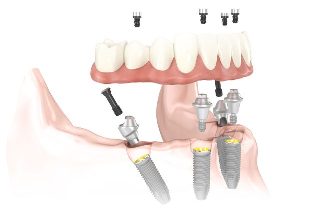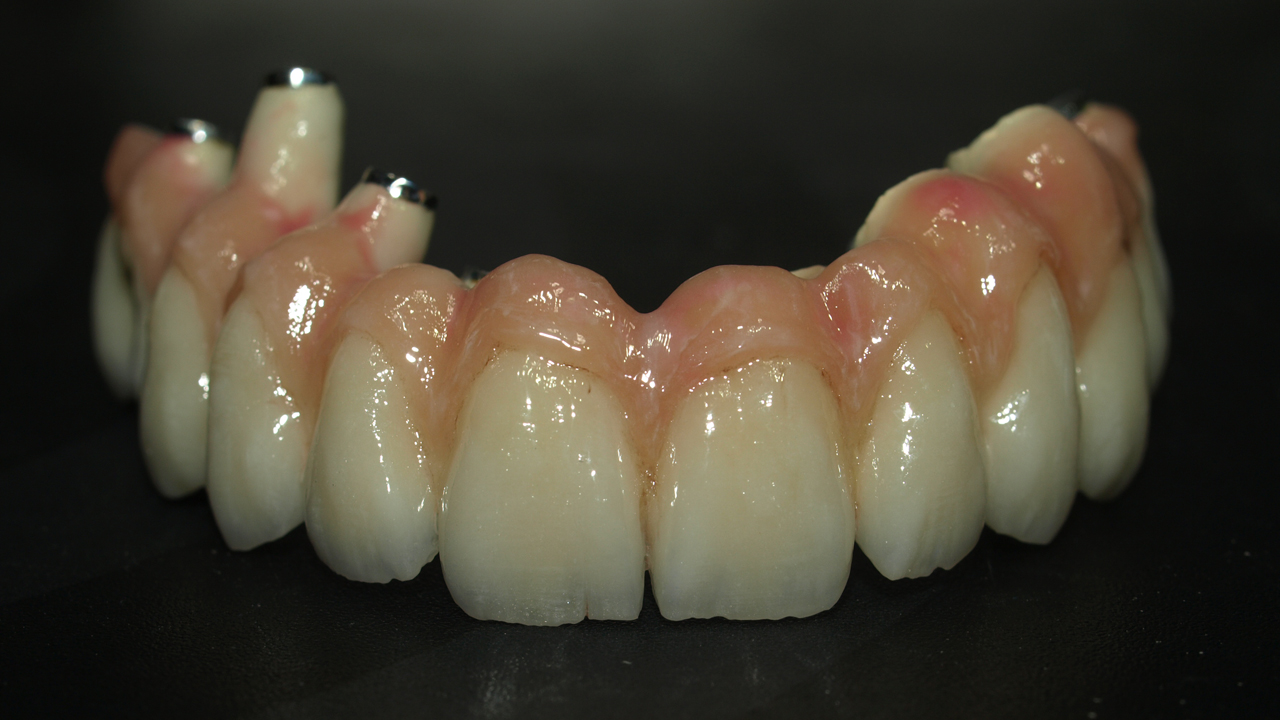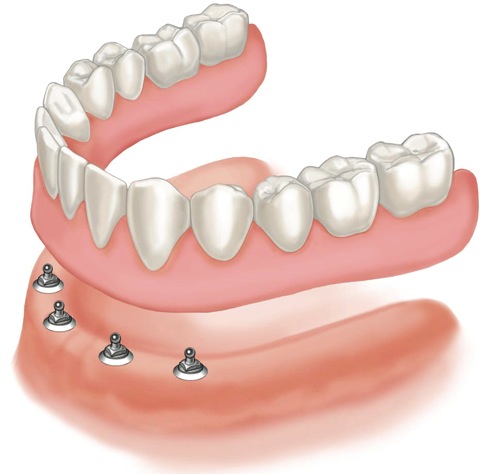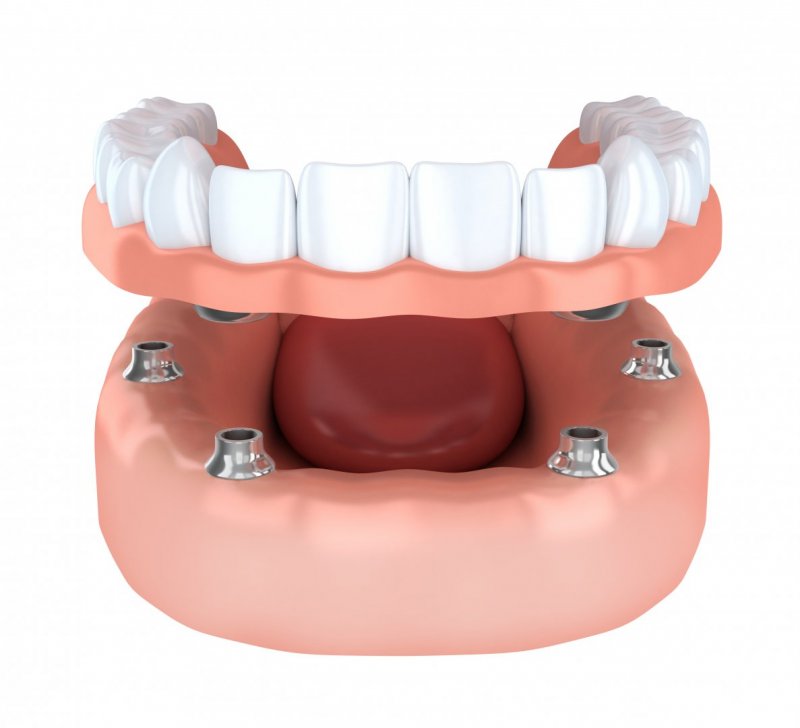Űrlap fejléc
Call us on
Ireland Toll Free: +353-1-800-817-333 (From landline only)
UK Toll Free: +44-0-808-258-0095
or request a call back:
Free First Consulting.
Book Now!
Ireland Toll Free (From landline only): +353-1-800-817-333
UK Toll Free: +44-0-808-258-0095
Implant-retained Solutions
Implant-retained Solutions Cost
£2.400
- Cost-Effective Way
- to Replace Missing Teeth
- Eliminate Disadvantages
- of Dentures
Implant-retained dentures are fixed securely onto 2, 4 or 6 implants for stability and support. This is an alternative for a denture only solution. These supported structures may be fitted on the implants in two ways, either by having a removable overdenture which clicks on the implants or a non-removable implant-bridge which is secured on the implant with a srcew.
This treatment is popular because it is less expensive than dental implants only. However, the implant solution is considered to be of higher quality. Dentures only – as opposed to implant-supported dentures - are more inconvenient and less stable if not fitted correctly. Plus they make it difficult to chew a number of food types. It also affects the way you speak.
As a result of implant-supported denture treatment, you will enjoy a greater comfort and confidence. It will also allow you to chew and speak properly. Implant retained denture is recommended if you lost all your teeth. If properly placed, it provides a lasting solution.
- Restore your Smile with an Implant Retained Denture
- Are you embarrassed by missing teeth?
- Are you tired of the inconvenience and discomfort of traditional dentures?
- Do you worry your dentures will pop out as you laugh or eat?
- Are you interested in a better option?
- Take the Next Step with an Implant Retained Denture
What is an Implant-retained Denture and Why should I have one?
Traditionally, people with missing teeth have faced two options; a toothless smile or an unsecured denture. While the second option may help to keep up appearances, many find the experience of wearing dentures painful, inconvenient and embarrassing. Not only is chewing and enjoying certain foods a problem, but eating comes with the worry that the dentures will slip out and cause embarrassment. Speaking and laughing carry the same risk. As gums recede and dentures lose their snug fit, sore spots can develop as the prosthesis slips around the mouth. Speech can also be affected.
A means of overcoming these problems and enjoying a restored, confident smile is presented by an Implant-retained Denture. Unlike traditional dentures that rest on the gum, this type of denture is attached to, and supported by, implants. With this firm foundation of support, the denture feels stable and secure. The wearer can eat, speak and laugh as normal, free from worry or mishap.
What Types of Implant-retained Solutions are Available?
Implant-retained solutions come in a several different varieties. They are distinguishable by the number of implants used, and the permanency of the replacement teeth (some offer a fixed bridge while others offer a removable prosthesis). Solutions that require a greater number of implants (such as the Fixed Full-arch Bridge) may require areas of low bone density to be build up using a bone graft before implantation. Others (such as the All-on-4) manage to avoid the need for a bone graft by strategic placement of the implants. These solutions offer you with fixed, non-removeable bridges.
Your dentist will discuss the most suitable options with you during your consultation. In the meantime, we’ve included a quick rundown of the different types, along with their pros and cons:
| Discription | Advantages | Disadvantages |
|---|---|---|
| As few as 4 implants and a full dental arch. | Excellent cost to benefit ratio (i.e., full arch rehabilitation with a minimal amount of implants). Avoids the need for a bone graft by tilting the placement of posterior implants to utilize available bone-Immediate function via a fixed provisional bridge-Immediate loading of implants often possible | Using so few implants carries the risk that if one fails, there will be too few implants for the bridge to function. |

| Discription | Advantages | Disadvantages |
|---|---|---|
| 4-8 implantsor more and a fixed dental bridge | Usually uses more implants than the All-on-4 so has a greater chance of survival if one implant fails. | More expensive than the All-on-4 as typically uses more implants |

Implant-retained Overdenture (clip-on denture)
| Discription | Advantages | Disadvantages |
|---|---|---|
| 2 or 4 implants and a removable prosthesis (this is the most similar to a traditional denture) | Provides more support than a traditional denture. The most cost effective version | Shares some problems common to an unsupported denture (such as sore spots). Less stable than other options |

What’s the Process for Fitting an Implant-retained Denture?
The stages and timeframes for fitting an implant–retained denture can vary depending on the individual case. Typically, implant treatment involves two stages: 1) Placement of the implant in the bone and 2) Exposing the implant to “load” the denture to them. The second stage of surgery will generally be performed 4-6 months after implantation, which allows sufficient opportunity for the implant to fuse to the bone.
(Under certain circumstances, it may be possible to perform both steps of the procedure at the same time. During your initial consultation, your dentist will assess the condition and density of your bone to determine if immediate loading is viable, and discuss the option with you further).
As a general rule of thumb, you can expect the following steps as part of your treatment.
Step 1 – the Free, No Obligation Consultation
The main goal of the Free Initial Consultation will be to gather information about the condition and quantity of bone. This will help to determine whether a bone graft is required before the implant is placed; the best location for the implants; and the most suitable type of denture. A CT scan will be arranged. Impressions of your gums and remaining teeth may also be taken if a temporary denture is required. After the initial consultation, you will have the opportunity to discuss your treatment plan and confirm your choice of denture. You will also have the opportunity to confirm your preference of material for the denture, be it budget friendly acrylic, cosmetically pleasing porcelain or durable, highly aesthetic Zirconium.
Step 2 - the Implant is Placed
During the first step of surgery, a small incision is made into the gum to expose the jaw. The implant is placed and the incision is closed. After placement, a healing time of 4-6 months is normally required, during which time the bone will ossify around the implant. If certain conditions are met, same day loading of the implant may be possible. This is where a temporary denture is attached to the implant with an abutment on the same day as implantation. The temporary denture is not only functional (thus allowing normal eating habits to be resumed) but also gives the appearance of natural looking teeth during the healing process. Your dentist will discuss this possibility during the initial consultation.
Step 3 - the Impression is Taken
Once the recommend healing time has passed, the next step of surgery is scheduled (this step is unnecessary if the abutment has already been fitted as part of a same day loading procedure). The implant site is exposed via a small incision to allow access to the implant. A round piece of metal (known as a “healing cap”) is placed on the top of each exposed implant. The purpose of the healing cap is to hold the gums separate from the implant head, and allow contouring of the tissue. After 10-14 days, the healing caps are replaced by abutments (a post which connects the implant to the false tooth) and impressions of the jaw and abutments are taken for the permanent denture to be made.
Step 4 - the Denture is Fitted
During the final stage, a metal bar is placed over the abutments, and the denture is temporarily fitted to the framework to check for fit and comfort. After any necessary adjustments have been made, the denture is fixed permanently in place.
Step 5 - the Aftercare
Thanks to the use of anesthetic, the implant procedure itself is painless. After surgery, you may experience some degree of pain, discomfort or swelling. However, your dentist will provide medication and antibiotics to minimize any discomfort, and most patients are happy to return to their normal activities within 1-3 days.
How Much will an Implant-retained Denture Cost?
Our Implant-retained dentures start at just £4099 (prices vary depending on the type of denture and your choice of materials). If you have additional requirements, the total price will depend on the treatment type needed.
Whatever your treatment needs or objectives, you can be confident that we offer excellent value for money –patients save an average of up to 70% on UK prices by choosing Budapest Dental Care Clinics as their treatment provider. Our full price list can be found here.
Why Should I Choose Budapest Dental Care Clinics for my Treatment?
If you want to…
- Save up to 70% on UK prices
- Trust your teeth to a skilled, fully accredited dentist with decades of experience
- Have access to 24-hour support throughout your treatmen
- Enjoy peace of mind with our unbeatable Guarantee
- Avoid waiting lists and treatment delays with our expedited treatment promise
Request our Budapest Dental Care Package
Did you know that you can get free accommodation or even flight ticket refund* included into our Budapest Dental Care Package?
see package offers
*beyond 4000 EUR/ 3500 GBP treatment
Contact Us Now on Phone or via Form |
Don’t Delay Your Dental Treatment Any Longer!
© 2017 Budapest Dental Care Clinic | All rights reserved

- Dental Implants
- Dental Crown
- Dental Bridge
- Sinus Lift (excl. bone graft)
- Bone Graft
- Implant-retained Solutions
- Temporary Denture
- Smile Makeover
- Veneers
- Hygienic Treatment
- Teeth Whitening
- Root Canal Treatment/canal (All incl.)
- Gnathology
- Tooth Extraction
- Wisdom Tooth Extraction
- Tooth Filling and Ceramic Inlays
- X-Ray





